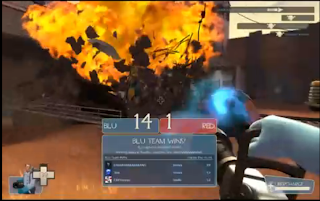
I like Firefly. It's a fun show. But not the
best show.
What makes it so fun is its originality, or its skewing of cliches. The show takes what you expect in a certain situation, then flips it upside down in an entertaining way. It's original because it does things that you don't expect so that you don't know what's going to happen.
So what does Firefly do to be original?
First, it flips dialog upside down to break from cliches. It takes the standard dialog exchanges that we all know and loathe and turns them into an entertaining and unusual experience.
Case 1:Mal and 'Jerk' are about to get into a bar fight because Jerk said something that Mal is not fond of. In a typical, cliched scenario Mal says, "Say that to my face," then Jerk repeats his comment by facing Mal, who then punches Jerk out of aggravation--boring. Here's what happens instead:
Mal: Say that to my face.
Jerk: I said, you're a coward and a piss-pot. Now what are ya gonna do about it?
Mal: Nothing. I just wanted you to face me so she could get behind you. Zoe hits him from behind
Yep. Fun.
Case 2:
Another example: Mal and his nemesis are in a fist battle, locked in an epic struggle of will power over a careening and deadly pit. Mal's friends come in to save him whereupon Zoe, Mal's first mate, intervenes and says that this is something Mal must finish for himself. The cliched outcome? Zoe and his friends let Mal almost die and then Mal defeats his enemy and calls it a good day. Here's what happens instead:
Zoë: Jayne, this is something the captain has to do for himself.
Mal: (Struggling) No! No it's not!
Zoë: Oh! (Zoe shoots the bad guy who was about to finish Mal off)
Wooee.
Case 3:
Last one
: Mal is trying to comfort his accidental wife into being an independent person. Normally, this would constitute a bunch of positive, cliched talk about free will and happiness. Instead, here's what happens:
- [Mal is alarmed about his new bride's expectations and attitudes.]
- Mal: Someone ever tries to kill you, you try to kill 'em right back! Wife or no, you are no one's property to be tossed aside. You got the right same as anyone to... live and try to kill people.
Mmmhmm.
There are two main ways the show treats its characters to reach these creative dialog exchanges.
The first method to get creative dialog is breaking from cliched characters by mixing them up from their orthodox roles. Instead of having the first mate of the ship be a cocky, young male, the first mate is a battle-hardened woman. Likewise, the mechanic of the ship is not a dirty old man who resembles a trucker, but an energetic and perky girl. Then you have the preacher who is not a stereotypical pacifist but instead adept with violence, weaponry, and the criminal way of life. The show thinks of the traditional way that the characters of 'captain', 'pilot', 'first mate', 'mechanic', and 'gunsmith' are portrayed, and then changes something about each character that makes them different from what is expected. This makes the situations the characters are put in much more fresh and interesting.
The second method the show uses to get creative dialog is by having deeply contrasting character traits. Jayne, the intellectually challenged gunsmith is contrasted with the smart and uptight doctor, Simon. Inara, the morally questionable "companion" is contrasted with the morally upright (and most times nameless) preacher. Kaylee, the young socialite is contrasted with the socially inept Simon. Inara, the polite and upper-class woman, is contrasted with the jovial and laid-back Kaylee. By having contrasting character traits, it creates some hilarious exchanges due to the differing backgrounds in terms of social status.
Case 4:This exchange illustrates the intellectual gap between Simon and the rest of the crew (Simon is teaching the crew doctor jargon in order to pose as orderlies and infiltrate a hospital):
Mal: "Patients were cynical and not responding and we couldn't bring 'em back-"
Simon: "They were cyanotic and not responsive."
Simon: (to Jayne) "What about cortical electrodes?"
Jayne: "Oh..." (obviously doesn't know the answer) "We forgot 'em."
Mal: "Pupils were fixed and dilapidated-"
Simon: "Dialated-"
When you put contrasting characters in a situation that explores their differences, funny things can happen. It's the disagreements between the characters that create the hilarity. If all the characters were from the same background, social status, or moral-standpoint, they would all agree on everything and act the same. Instead, opposing views make each conversation a joy. Conflict is good, right?
--
So, Firefly is a pretty fun show. Fun, but not as gripping as LOST or Battletar Galactica, partly due to its lackadaisical attitude. After some episodes, it does become a bit cringe worthy to see this mishapful crew of nine to jovially engage in laughter after all their space journeys of danger. There's never as much tension or drama that you get when dealing with "The Others" or the Cylons. However, Firefly's great dialog and original ideas make it a sometimes more enjoyable show.
Worth watching?Yes, definitely. You will have a fun time.
Labels: Firefly, TV
 Braid has been critically acclaimed (and rightfully so) for doing what it does right: innovation in conventional platforming (through a nifty time manipulation mechanic), beautiful hand-painted graphics, and an excellent soundtrack that all come together in a tightly polished package.
Braid has been critically acclaimed (and rightfully so) for doing what it does right: innovation in conventional platforming (through a nifty time manipulation mechanic), beautiful hand-painted graphics, and an excellent soundtrack that all come together in a tightly polished package.



